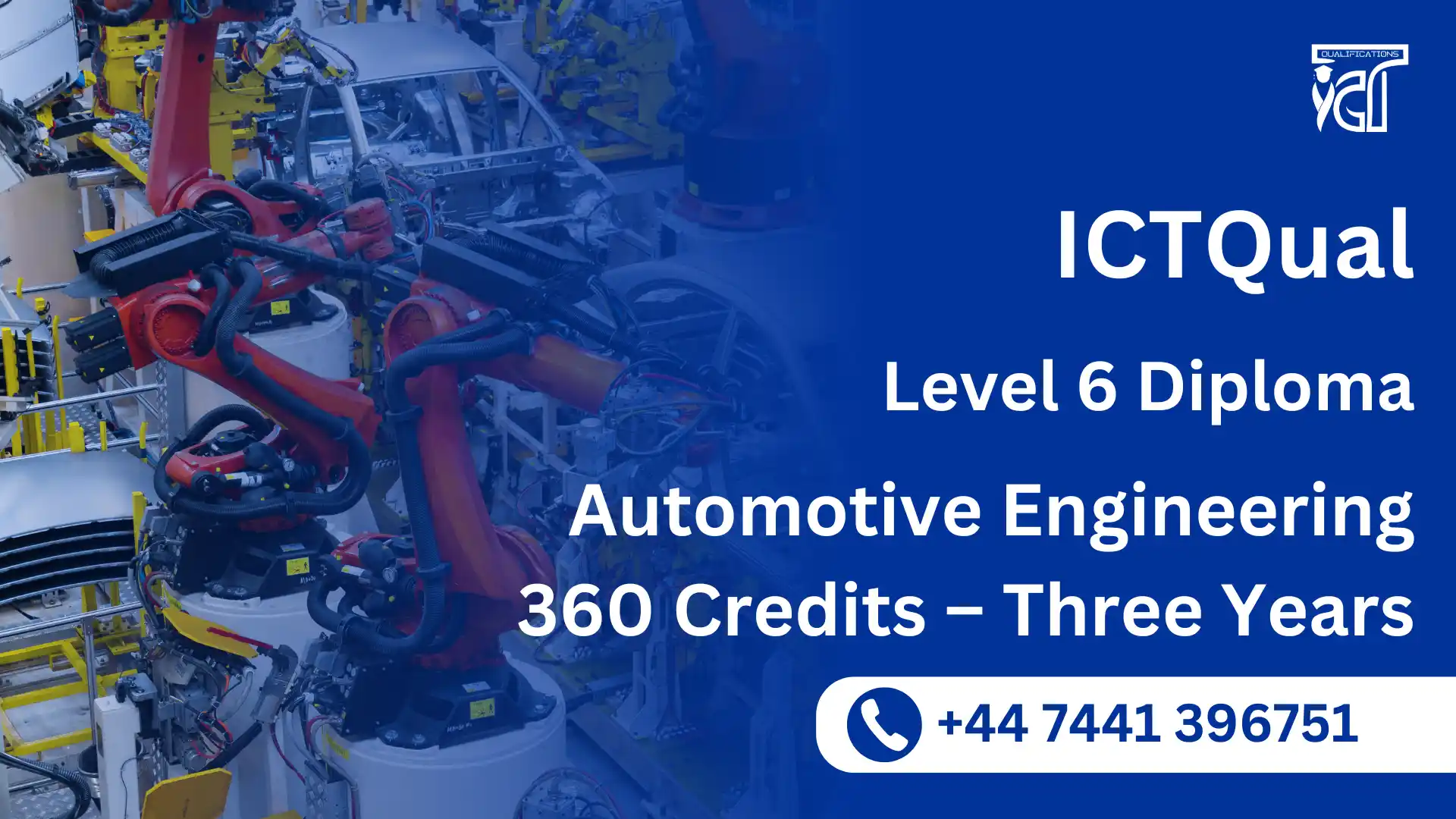The ICTQual Level 6 Diploma in Automotive Engineering 360 Credits – Three Years is a comprehensive three-year programme designed to equip learners with advanced technical knowledge and practical skills required for the modern automotive industry. Structured around a 360-credit framework, this diploma provides an in-depth understanding of vehicle design, engine systems, hybrid and electric technologies, automotive electronics, and emerging innovations in the sector. It is ideal for both freshers entering the automotive field and professionals seeking to advance their careers or specialise in cutting-edge automotive technologies.
Learners undertaking this programme will develop expertise in areas such as mechanical and electrical systems integration, vehicle diagnostics, performance optimisation, and sustainable automotive solutions. Through hands-on projects, simulations, and practical exercises, learners gain the skills necessary to analyse, design, and maintain complex automotive systems. Additionally, the programme enhances problem-solving, critical thinking, and project management capabilities, preparing learners to meet industry demands effectively.
Upon successful completion, learners can pursue careers as automotive engineers, vehicle systems designers, maintenance managers, or technical consultants within automotive manufacturers, repair and service centres, and research and development organisations. The diploma also prepares learners for leadership positions, enabling them to manage projects, implement innovative solutions, and contribute to advancements in vehicle technologies.
Key benefits of the programme include mastery of advanced automotive engineering principles, hands-on experience with modern automotive systems, enhanced employability, development of analytical and project management skills, and preparation for both technical and leadership roles in the automotive sector. Whether learners are starting their professional journey or enhancing their existing expertise, the ICTQual Level 6 Diploma in Automotive Engineering provides a strong foundation for long-term career success and global opportunities in the automotive industry.
ICTQual Level 6 Diploma in Automotive Engineering 360 Credits – Three Years
This qualification, the ICTQual Level 6 Diploma in Automotive Engineering 360 Credits – Three Years, consists of 36 mandatory units.
Year 1: Foundation and Core Engineering Principles
- Introduction to Automotive Engineering
- Mathematics for Automotive Engineering
- Physics for Automotive Engineering
- Mechanical Engineering Principles
- Automotive Systems and Technology
- Electrical and Electronic Systems in Vehicles
- Engineering Materials for Automotive Design
- Vehicle Chassis and Suspension Systems
- Introduction to Vehicle Diagnostics
- Manufacturing Processes for Automotive Engineering
- Automotive Environmental Issues
- Health, Safety, and Environmental Management
Year 2: Advanced Automotive Technologies and Systems
- Advanced Engine Technologies
- Vehicle Dynamics and Handling
- Advanced Automotive Electronics
- Transmission and Powertrain Systems
- Vehicle HVAC Systems
- Vehicle Safety Systems
- Hybrid and Electric Vehicle Technologies
- Automotive Aerodynamics
- Automotive Materials Engineering
- Vehicle Assembly and Production Techniques
- Automotive Diagnostics and Troubleshooting
- Vehicle Testing and Performance Evaluation
Year 3: Industry Applications, Management, and Innovation
- Advanced Vehicle Design and Prototyping
- Automotive Control Systems
- Automotive Quality Control and Assurance
- Sustainability in Automotive Engineering
- Automotive Project Management
- Automotive Research and Development
- Vehicle Electromagnetic Compatibility
- Automotive Business and Marketing
- Autonomous Vehicles and Future Technologies
- Vehicle Fleet Management and Operations
- Automotive Regulatory Compliance and Standards
- Capstone Project in Automotive Engineering
Learning Outcomes for the Level 6 Diploma in Automotive Engineering 360 Credits – Three Year:
Year 1: Foundation and Core Engineering Principles
Introduction to Automotive Engineering
- Identify the key principles of automotive engineering and its significance in modern vehicle design and development.
- Understand the major components and systems of a vehicle, and their functions.
- Develop the ability to assess the role of automotive engineers in improving vehicle performance and innovation.
Mathematics for Automotive Engineering
- Apply mathematical techniques to solve automotive engineering problems related to vehicle design and performance.
- Utilize algebra, calculus, and geometry to model and analyze automotive systems.
- Demonstrate proficiency in using mathematical tools to optimize automotive components and systems.
Physics for Automotive Engineering
- Apply physical principles such as motion, force, and energy to solve automotive engineering problems.
- Analyze the impact of physical laws on the design, performance, and safety of vehicles.
- Understand the relationship between physical properties and the efficiency of automotive systems.
Mechanical Engineering Principles
- Develop a solid understanding of mechanical principles including statics, dynamics, and thermodynamics as applied to automotive engineering.
- Apply mechanical engineering principles to the design and evaluation of automotive systems and components.
- Understand the interaction between mechanical engineering concepts and automotive technologies.
Automotive Systems and Technology
- Identify the main systems in vehicles, such as powertrains, braking systems, and suspension.
- Understand the technological advancements in automotive systems that improve vehicle performance.
- Develop the ability to analyze the interaction of various automotive technologies in modern vehicles.
Electrical and Electronic Systems in Vehicles
- Understand the role of electrical and electronic systems in vehicle operation and performance.
- Apply principles of circuit design, sensors, and control systems to vehicle electronics.
- Develop problem-solving skills to troubleshoot electrical issues in automotive systems.
Engineering Materials for Automotive Design
- Identify the types of materials used in automotive design, including metals, plastics, and composites.
- Analyze the mechanical properties of materials used in automotive applications.
- Understand the relationship between material selection and vehicle performance, safety, and durability.
Vehicle Chassis and Suspension Systems
- Analyze the function of vehicle chassis and suspension systems in providing stability and comfort.
- Understand the design principles of chassis and suspension systems to enhance vehicle handling.
- Develop the ability to select appropriate chassis and suspension components for specific vehicle types.
Introduction to Vehicle Diagnostics
- Understand the basic principles and tools of vehicle diagnostics.
- Identify common vehicle faults using diagnostic systems and troubleshooting techniques.
- Apply diagnostic methods to evaluate the performance of vehicle components and systems.
Manufacturing Processes for Automotive Engineering
- Identify various manufacturing processes used in automotive production, such as casting, machining, and welding.
- Understand the relationship between manufacturing processes and the quality of automotive products.
- Develop the ability to optimize manufacturing techniques to improve efficiency and reduce costs.
Automotive Environmental Issues
- Understand the environmental challenges facing the automotive industry, including air quality and waste management.
- Explore solutions to reduce the environmental impact of vehicles, such as fuel efficiency and emissions reductions.
- Assess the role of automotive engineers in designing sustainable vehicles and manufacturing processes.
Health, Safety, and Environmental Management
- Understand the importance of health, safety, and environmental standards in automotive engineering.
- Apply relevant health and safety regulations in automotive design, manufacturing, and testing.
- Develop strategies to manage environmental impact and improve sustainability in automotive engineering projects.
Year 2: Advanced Automotive Technologies and Systems
Advanced Engine Technologies
- Analyze the components and operation of advanced engine systems, including turbocharging, hybridization, and fuel injection.
- Evaluate the performance and efficiency of different engine technologies.
- Apply advanced techniques to improve engine efficiency, emissions, and overall performance.
Vehicle Dynamics and Handling
- Understand the fundamental principles of vehicle dynamics, including tire-road interaction, stability, and control.
- Apply knowledge of suspension, steering, and braking systems to optimize vehicle handling and performance.
- Develop solutions to improve vehicle handling, particularly under dynamic driving conditions.
Advanced Automotive Electronics
- Understand advanced automotive electronic systems, including in-vehicle networks, sensors, and ECU programming.
- Apply electronics to improve vehicle safety, performance, and comfort.
- Develop diagnostic and troubleshooting skills for complex automotive electronic systems.
Transmission and Powertrain Systems
- Analyze the function and performance of transmission and powertrain systems in vehicles.
- Understand the design and operation of manual, automatic, and continuously variable transmissions (CVT).
- Apply knowledge to optimize powertrain efficiency, reduce emissions, and improve driving dynamics.
Vehicle HVAC Systems
- Understand the principles and design of heating, ventilation, and air conditioning (HVAC) systems in vehicles.
- Analyze the impact of HVAC systems on vehicle comfort, fuel efficiency, and environmental sustainability.
- Develop solutions for improving HVAC system performance and energy efficiency in modern vehicles.
Vehicle Safety Systems
- Understand the design and operation of advanced vehicle safety systems such as airbags, collision avoidance, and lane assist.
- Evaluate the effectiveness of safety systems in preventing accidents and reducing injury.
- Develop strategies to improve vehicle safety through advanced system integration.
Hybrid and Electric Vehicle Technologies
- Understand the core principles and technologies behind hybrid and electric vehicles.
- Analyze the advantages and challenges of hybrid and electric powertrains compared to traditional combustion engines.
- Develop skills to design and integrate hybrid and electric powertrains into modern vehicles.
Automotive Aerodynamics
- Apply aerodynamic principles to vehicle design to reduce drag, improve fuel efficiency, and enhance stability.
- Understand the effects of vehicle shape and surface finish on aerodynamic performance.
- Develop strategies to optimize vehicle aerodynamics for both performance and environmental impact.
Automotive Materials Engineering
- Identify and analyze advanced materials, including lightweight composites and high-strength alloys, used in automotive applications.
- Apply material science principles to improve vehicle safety, performance, and sustainability.
- Develop solutions for selecting and manufacturing materials that meet specific vehicle performance requirements.
Vehicle Assembly and Production Techniques
- Understand the processes involved in the assembly and production of vehicles, including robotic automation and quality control.
- Analyze production workflows and systems to optimize vehicle manufacturing.
- Apply lean manufacturing principles to reduce waste and improve production efficiency.
Automotive Diagnostics and Troubleshooting
- Develop advanced diagnostic skills for troubleshooting complex automotive systems, including electrical, mechanical, and electronic faults.
- Use modern diagnostic tools, including OBD-II systems and software, to identify and resolve issues.
- Develop a methodical approach to system diagnostics and fault resolution.
Vehicle Testing and Performance Evaluation
- Understand the principles and methods of vehicle testing, including road testing, performance evaluation, and regulatory compliance.
- Apply testing techniques to assess vehicle safety, fuel efficiency, and emissions.
- Analyze test data to recommend improvements in vehicle design and performance.
Year 3: Industry Applications, Management, and Innovation
Advanced Vehicle Design and Prototyping
- Apply advanced design principles to create innovative vehicle prototypes using CAD and other design software.
- Understand the prototyping process, from concept to production-ready models.
- Develop skills to test and refine prototypes for performance, safety, and manufacturability.
Automotive Control Systems
- Understand the design and application of control systems in modern vehicles, including adaptive cruise control and stability control systems.
- Apply control theory to optimize vehicle performance, comfort, and safety.
- Analyze and improve control algorithms for vehicle systems using real-time feedback.
Automotive Quality Control and Assurance
- Apply quality control methodologies to ensure automotive components meet industry standards and specifications.
- Use statistical tools and techniques to monitor and control product quality throughout the production process.
- Develop strategies for continuous improvement in automotive manufacturing and assembly processes.
Sustainability in Automotive Engineering
- Understand the environmental impact of the automotive industry, focusing on sustainability issues such as energy consumption and material usage.
- Develop solutions to improve the sustainability of automotive designs through energy-efficient technologies and eco-friendly materials.
- Analyze the role of automotive engineers in promoting sustainability through lifecycle assessments and sustainable manufacturing practices.
Automotive Project Management
- Understand the principles of project management, including scope, time, cost, and quality management in automotive projects.
- Apply project management tools and techniques to plan, execute, and close automotive engineering projects.
- Develop the ability to manage resources, stakeholders, and risks in large-scale automotive engineering projects.
Automotive Research and Development
- Conduct research to solve emerging problems in automotive engineering, focusing on new technologies and methods.
- Analyze and evaluate new automotive concepts and prototypes to assess feasibility and performance.
- Apply R&D principles to develop innovative automotive solutions and improve existing systems.
Vehicle Electromagnetic Compatibility
- Understand the principles of electromagnetic compatibility (EMC) and its relevance to vehicle design and performance.
- Analyze the impact of electromagnetic interference on vehicle systems, particularly electronics and communication.
- Develop strategies to mitigate EMC issues in vehicle design and ensure compliance with industry standards.
Automotive Business and Marketing
- Understand the principles of business and marketing in the automotive industry, including market research, product positioning, and branding.
- Analyze consumer behavior and identify trends to guide automotive product development.
- Develop marketing strategies for automotive products, focusing on competitive advantages and customer needs.
Autonomous Vehicles and Future Technologies
- Understand the core technologies behind autonomous vehicles, including sensors, machine learning, and vehicle-to-vehicle communication.
- Analyze the potential impact of autonomous vehicles on the automotive industry and society.
- Explore the future of automotive technologies, including connected vehicles, AI, and next-generation propulsion systems.
Vehicle Fleet Management and Operations
- Understand the principles of managing and maintaining a fleet of vehicles, focusing on cost optimization, performance, and safety.
- Develop strategies for tracking and optimizing fleet performance through data analysis and monitoring tools.
- Apply fleet management principles to maximize the efficiency and lifespan of vehicles in various industries.
Automotive Regulatory Compliance and Standards
- Understand the regulatory framework governing the automotive industry, including safety, environmental, and quality standards.
- Apply industry standards to ensure vehicle designs meet legal and regulatory requirements.
- Develop strategies to navigate regulatory changes and ensure ongoing compliance in automotive engineering projects.
Capstone Project in Automotive Engineering
- Apply all the knowledge and skills acquired during the course to solve a real-world automotive engineering challenge.
- Conduct research, design, prototype, and test a solution to an automotive engineering problem.
- Present the results of the capstone project, demonstrating technical expertise, problem-solving ability, and innovation.
The ICTQual Level 6 Diploma in Automotive Engineering offers learners a comprehensive learning experience that combines theoretical knowledge, practical skills, and professional expertise. This programme is designed to enhance employability, develop technical and managerial capabilities, and prepare learners for advanced roles within the automotive sector. By completing this diploma, learners gain a competitive advantage, build confidence in working with complex automotive systems, and are well-equipped to contribute to innovation and operational efficiency in the global automotive industry.
Advanced Technical Expertise
- Master principles of automotive engineering, including engine systems, vehicle design, and hybrid/electric technologies
- Gain proficiency in automotive electronics, diagnostics, and system integration
- Develop the ability to design, implement, and maintain complex vehicle systems
Career Progression and Employability
- Open pathways to roles such as Automotive Engineer, Vehicle Systems Designer, Maintenance Manager, or Technical Consultant
- Enhance professional credibility and career prospects in both local and international automotive industries
- Prepare for leadership, supervisory, or specialist positions within automotive projects
Practical and Hands-On Learning
- Apply theoretical knowledge through workshops, simulations, and real-world automotive projects
- Gain experience with modern diagnostic tools, vehicle systems, and automotive software
- Build problem-solving, analytical, and troubleshooting skills essential for everyday automotive engineering tasks
Leadership and Project Management Development
- Learn project management techniques to plan, execute, and monitor automotive engineering projects
- Develop leadership and team coordination skills for managing technical teams
- Acquire communication and decision-making capabilities necessary for senior roles
Global Career Opportunities
- Understand international automotive standards, regulations, and best practices
- Access career opportunities in automotive manufacturing, research and development, vehicle design, and maintenance industries
- Develop transferable skills applicable across multiple countries and technology environments
The ICTQual Level 6 Diploma in Automotive Engineering is designed for learners who are motivated to build a successful career in the automotive sector. It caters to both freshers looking to establish a strong technical foundation and professionals aiming to enhance their expertise and progress into senior or specialised roles. Learners should be committed to developing practical skills, critical thinking, and leadership capabilities in complex automotive environments.
Aspiring Automotive Engineers
- Fresh learners seeking a solid foundation in automotive engineering principles
- Individuals aiming to secure entry-level positions in vehicle design, maintenance, or automotive production
- Learners interested in hands-on experience with modern automotive technologies
Working Professionals Seeking Advancement
- Engineers or technicians looking to upgrade their qualifications and technical expertise
- Professionals targeting managerial, supervisory, or project leadership roles
- Learners wishing to specialise in areas such as hybrid/electric vehicles, automotive electronics, or vehicle diagnostics
Career Switchers
- Individuals from related technical or engineering backgrounds seeking to transition into automotive engineering
- Learners looking to gain industry-recognised credentials and formal certification
Lifelong Learners
- Those committed to continuous professional development and upskilling
- Learners interested in staying updated with emerging automotive technologies, industry standards, and best practices
Globally-Minded Professionals
- Individuals aspiring to work in international automotive environments
- Learners who value transferable skills applicable across multiple industries and countries
- Professionals aiming to contribute to global vehicle design, production, and innovation projects
Completing the ICTQual Level 6 Diploma in Automotive Engineering equips learners with the technical expertise, practical skills, and leadership capabilities required to excel in the automotive industry. Graduates can access multiple career pathways and further academic opportunities, both locally and internationally.
Senior Automotive Engineering Roles
- Progress to positions such as Senior Automotive Engineer, Vehicle Systems Designer, or Lead Engineer
- Take responsibility for designing, implementing, and managing complex vehicle systems and production processes
- Lead technical teams on large-scale automotive projects and contribute to strategic decision-making
- Apply advanced problem-solving and analytical skills to enhance vehicle performance and efficiency
Project Management and Supervisory Opportunities
- Transition into project management roles overseeing automotive engineering projects from planning to execution
- Manage resources, budgets, and timelines effectively within engineering teams
- Develop leadership, communication, and decision-making skills essential for supervisory positions
- Ensure projects meet quality, safety, and operational standards
Specialisation in Advanced Automotive Fields
- Develop expertise in emerging areas such as hybrid and electric vehicles, automotive electronics, and autonomous systems
- Pursue specialised roles in vehicle diagnostics, performance optimisation, and research and development
- Gain skills for consultancy or advisory positions in complex automotive projects
- Stay updated with cutting-edge technologies and industry innovations
Academic and Professional Advancement
- Use the diploma as a foundation for further academic qualifications, such as postgraduate degrees or professional certifications
- Access advanced learning opportunities to deepen knowledge in specialised automotive areas
- Strengthen professional credentials to enhance employability and credibility across global markets
Global Career Opportunities
- Access international career opportunities in automotive manufacturing, R&D, vehicle design, and maintenance industries
- Apply transferable skills across multiple countries and technology environments
- Contribute to global automotive projects requiring both technical expertise and leadership capabilities
- Build a professional profile recognised and valued by multinational automotive organisations
Route 1: For Experienced Candidates
This route is designed for learners who already have significant work experience in the telecommunications industry.
- Eligibility: Learners must have at least six years of verifiable experience in telecom engineering or a related technical field.
- Assessment of Competence: Learners do not need to complete the full training programme. The ICTQual Approved Training Centre will assess whether their existing knowledge and skills meet the learning outcomes of the diploma.
- Evidence Submission: Candidates must submit documentation verifying their work experience, including job roles, responsibilities, and tasks that demonstrate competence in telecom engineering principles.
- Knowledge Verification: The centre ensures learners are familiar with all course learning outcomes. If gaps are identified, additional guidance or focused learning may be provided.
- Certification: Upon successful verification of experience and competence, learners will be awarded the ICTQual Level 6 Diploma in Telecom Engineering.
Route 2: For Fresh Learners
This route is ideal for individuals who are new to the telecommunications field and do not have prior work experience.
- Admission: Learners must enrol with our ICTQual Approved Training Centre to access the programme.
- Training: Learners will complete structured training covering all essential study units in telecommunications engineering.
- Assignments: Fresh learners are required to complete 36 assignments aligned with the learning outcomes of the course. These assignments are designed to develop both theoretical knowledge and practical skills.
- Assessment and Certification: After completing all assignments and assessments successfully, learners will be awarded the ICTQual Level 6 Diploma in Telecom Engineering.
Both routes ensure that learners, whether experienced professionals or fresh entrants, gain the knowledge, skills, and formal recognition required to advance their careers in telecommunications.
Entry Requirements
Minimum Age
- Learners must be at least 18 years old at the time of enrolment.
Educational Background
- A minimum of high school completion (or equivalent) is required, with a strong foundation in mathematics, physics, and basic engineering concepts.
- Prior qualifications in automotive, mechanical, or electrical engineering are advantageous but not mandatory for fresh learners.
Work Experience
- Experienced Candidates: Must have at least six years of verifiable experience in automotive engineering, vehicle maintenance, or a related technical field.
- Fresh Learners: No prior work experience is required; learners will complete the full training programme and 36 assignments to achieve the diploma.
Language Proficiency
- Learners must demonstrate proficiency in English, both written and spoken, to effectively engage with course materials, complete assignments, and participate in assessments.
- Standardised English language qualifications or internal assessment by the training centre may be required.
Centre Requirements
- Learners must enrol through an ICTQual Approved Training Centre to access study materials, practical sessions, and assignment submissions.
- Centres provide guidance, support, and assessment to ensure learners meet the programme’s learning outcomes.
Additional Recommendations
- Learners should have strong analytical and problem-solving skills, an interest in automotive systems and technologies, and a commitment to completing assignments and practical projects.
- Basic knowledge of computer applications and automotive diagnostic tools is beneficial.
Register Now
Qualification Process
Qualification Process for the ICTQual Level 6 Diploma in Automotive Engineering 360 Credits – Three Years
- Self-Assessment:
Begin by evaluating your eligibility to ensure you meet the qualification requirements, including work experience, knowledge, and language proficiency. - Registration:
Complete your registration by submitting the required documents, including a scanned copy of a valid ID, and paying the registration fee. - Induction:
An assessor will conduct an induction to confirm your eligibility for the course and explain the evidence requirements. If you do not meet the criteria, your registration will be cancelled, and the fee will be refunded. - Assignments & Evidence Submission:
Provide all assignments and the necessary evidence based on the assessment criteria outlined in the course. If you are unsure of the required evidence, consult with the assessor for guidance on the type and nature of evidence needed. - Feedback and Revision:
The assessor will review your submitted evidence and provide feedback. Evidence that meets the criteria will be marked as “Criteria Met,” while any gaps will be identified. You will be asked to revise and resubmit if needed. - Competence Evidence:
Submit final evidence demonstrating that all learning outcomes have been met. This evidence will be marked as “Criteria Met” by the assessor once it is satisfactory. - Internal Quality Assurance (IQA):
The Internal Quality Assurance Verifier (IQA) will review your evidence to ensure consistency, quality, and compliance with standards. - External Verification:
The IQA will submit your portfolio to ICTQUAL AB External Quality Assurance Verifiers (EQA) for final confirmation. The EQA may contact you directly to verify the authenticity of your evidence. - Certification:
Upon successful completion of all checks, ICTQUAL AB will issue your official certificate, confirming that you have attained the ICTQual Level 6 Diploma in Automotive Engineering 360 Credits – Three Years.







